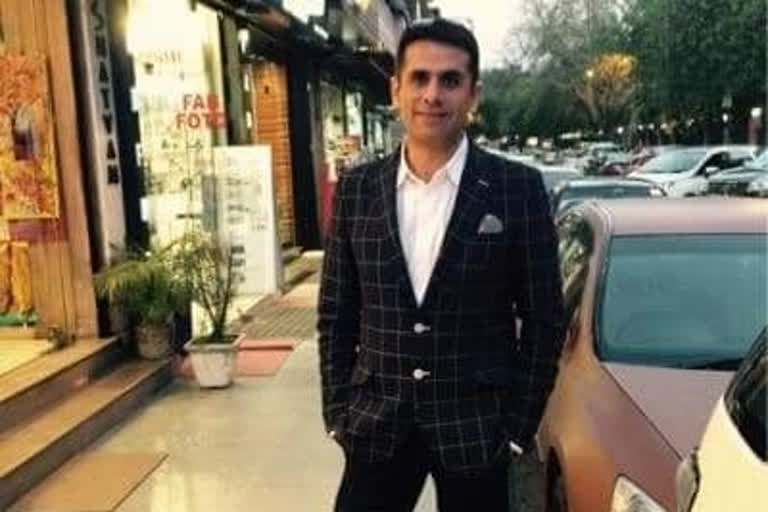New Delhi: The Delhi High Court on Thursday asked Navneet Kalra, seeking anticipatory bail in connection with alleged black marketing of oxygen concentrators, whether he could have held on to and sold hundreds of such devices without a licence under the Drugs and Cosmetics Act.
Justice Subramonium Prasad posed the query during the late night hearing of Kalra's plea for anticipatory bail after he was denied the relief by a sessions court.
Earlier in the day, a sessions court dismissed Kalra's anticipatory bail plea, saying the allegations against him are serious and his custodial interrogation is required to "unearth the entire conspiracy".
Subsequently, he rushed to the high court which late in the evening started hearing his plea for anticipatory bail and the arguments which went on for more than two hours will continue on Friday afternoon.
Meanwhile, a magisterial court granted bail to an employee of upscale restaurant 'Town Hall', owned by Kalra, in connection with a case of black marketing of oxygen concentrators.
Chief Metropolitan Magistrate Arun Kumar Garg directed Hitesh Kumar not to tamper with evidence or influence witnesses, join the investigation as and when called by the police and furnish a personal bond of Rs 50,000.
During the hearing in the high court, Justice Subramonium Prasad said that since medical devices like oxygen concentrators are also drugs according to the Drugs and Cosmetics Act, therefore, a valid licence is required to manufacture, store or sell drugs and not having the same amounts to a violation which entails punishment of 10 years jail term.
Senior advocates Abhishek M Singhvi and Vikas Pahwa, appearing for Kalra, said that this was not the focus of the prosecution whose case has been that he sold the equipment at a price above the cap fixed by the central government and that he cheated those who bought the concentrators from him
During a recent raid, 524 oxygen concentrators were recovered from three restaurants owned by Kalra -- Khan Chacha, Nega Ju and Town Hall -- and he is suspected to have left Delhi along with his family. The concentrators are crucial medical equipment used for COVID-19 patients.
Singhvi said that his client bought the concentrators from Matrix Cellular after paying GST and the payment was made via credit card, therefore, there was nothing clandestine about the purchase of the equipment.
He said that Kalra sold the equipment within the labelled price that Matrix, which imported the concentrators, had fixed.
The high court said that what had to be seen in the instant case was whether a price had been fixed for concentrators under the Drug Price Control Order (DPCO) and if yes, then it would come under the essential commodities.
Singhvi and Pahwa said that for the equipment to come under the essential commodities, its price has to be regulated which was not done in the instant case.
They said that a division bench of the high court has been "lamenting" that no price has been fixed for oxygen cylinders and concentrators and it has been repeatedly asking the Centre to do so to "plug loopholes" which could occur in the future.
Additional Solicitor General (ASG) S V Raju, who appeared for the state and would continue his arguments on Friday, opposed Kalra's plea and told the high court that it was "a clear case of black marketing by taking advantage of the needy people during the pandemic".
The ASG said that instead of coming and supporting the needy in the present situation, Kalra was taking advantage of them and that was a "heinous offence".
He further said that Kalra induced buyers to purchase the concentrators saying they were of premium quality and made with German technology when the equipment were of "Chinese origin and third rate quality".
The ASG said that according to laboratory tests of the concentrators, their output was only 32 per cent oxygen, to which the high court asked him to place before it the lab reports on Friday.
Delhi: Lookout notice against businessman Navneet Kalra in oxygen concentrators black marketing case
He said it has to be ascertained whether anyone who bought the concentrators from Kalra died as a result of using the machine and the investigation in the case was at a crucial stage.
The ASG said if any relief was granted to Kalra, it would send out a wrong message to all black marketeers that they can get relief from courts on a technicality and therefore they can make merry.
During the over two-hour-long hearing, Singhvi also told the court that the police was under pressure to arrest his client as the press "was baying for his blood".
The senior lawyer said that his client was forced to seek anticipatory bail in view of the media reporting of the case.
Singhvi further said that his client was willing to help the police get to the bottom of it, but not if he was going to be treated as a "bleating criminal".
He also said that his client did not cheat or induce anyone to buy the concentrators from him, and out of the hundreds he had sold, only two or three buyers have complained.
Singhvi also said that the charge against his client was not that he sold above the labelled price, rather the charge was that he sold at a price that was above the cap set by the Centre.
However, no such cap has been set by the Centre, he contended.
Additional Session Judge Sandeep Garg had dismissed Kalra's application and stated, "custodial interrogation of accused is required to be carried out to unearth the entire conspiracy hatched between him and a number of co-accused persons".
PTI
Also Read: Court dismisses anticipatory bail plea of Navneet Kalra



